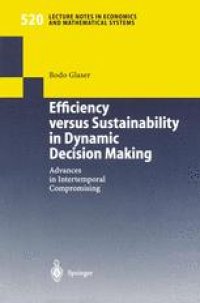
Ebook: Efficiency versus Sustainability in Dynamic Decision Making: Advances in Intertemporal Compromising
Author: Dr. Bodo Glaser (auth.)
- Tags: Operation Research/Decision Theory
- Series: Lecture Notes in Economics and Mathematical Systems 520
- Year: 2002
- Publisher: Springer-Verlag Berlin Heidelberg
- Edition: 1
- Language: English
- pdf
To all who taught me, and to all who will. Over the past fifteen years the notions of efficiency and sustainability have, more than any others, influenced the academic and public discussion concerning the intertemporal allocation of resources, especially as regards the economics of growth and environment. This treatise formally develops and counterposes these notions by means of the construct of a trajectorial objective, which is here developed, along with its implications, as a natural advance upon the classical scalar objective. In the course of this study it becomes clear that efficiency and sustainability are by no means identical, given that efficiency, on the one hand, is the concept for avoiding wasteful behavior, and sustainability, on the other, is the concept for ensuring that certain critical aspiration levels, which usually reflect the wish for survival, are maintained. Nonetheless, contrary to what may be assumed, these two concepts do not generally yield mutually exclusive solutions; in fact, they can be combined to complement each other in the quest for unimprovable long-term solutions which sustain given and necessary aspiration levels. This treatise develops and analyzes dynamic decision models (DDM) with one trajectorial objective according to the methodology of multi criteria decision making (MCDM). Moreover, introducing the method of distance maximization crucially augments MCDM and proves to be invaluable for DDMs in the case of a nonexistent utopia trajectory as well as in the case of sustainability as objective.
This book develops and analyzes dynamic decision models (DDM) with one trajectoral objective according to the methodology of multi-criteria decision making (MCDM). Moreover, DDMs which concomitantly pursue multiple objectives are analyzed, with special emphasis given to hybrid models with scalar and trajectorial objectives as well as models with multiple trajectorial objectives. Introducing the method of distance maximization crucially augments MCDM and proves to be invaluable for DDMs with nonexistent utopia trajectory or with sustainability as objective. The notions of efficiency and sustainability are formally developed and counterposed by means of the construct of trajectorial objective, which is presented here, along with its implications, as a natural advance upon the classical scalar objective.
This book develops and analyzes dynamic decision models (DDM) with one trajectoral objective according to the methodology of multi-criteria decision making (MCDM). Moreover, DDMs which concomitantly pursue multiple objectives are analyzed, with special emphasis given to hybrid models with scalar and trajectorial objectives as well as models with multiple trajectorial objectives. Introducing the method of distance maximization crucially augments MCDM and proves to be invaluable for DDMs with nonexistent utopia trajectory or with sustainability as objective. The notions of efficiency and sustainability are formally developed and counterposed by means of the construct of trajectorial objective, which is presented here, along with its implications, as a natural advance upon the classical scalar objective.
Content:
Front Matter....Pages I-IX
Introduction....Pages 1-3
Front Matter....Pages 5-5
Fundamentals of Decision Making....Pages 7-20
Fundamentals of Multi-criteria Decision Making....Pages 21-73
Front Matter....Pages 75-75
Fundamentals of Dynamic Decision Making....Pages 77-90
Type A Objective: ’The Destination Matters’....Pages 91-106
Type B Objective: ’The Journey is the Goal’....Pages 107-189
Multiple Objectives in Dynamic Decision Making....Pages 191-224
Concluding Remarks....Pages 225-228
Back Matter....Pages 229-254
This book develops and analyzes dynamic decision models (DDM) with one trajectoral objective according to the methodology of multi-criteria decision making (MCDM). Moreover, DDMs which concomitantly pursue multiple objectives are analyzed, with special emphasis given to hybrid models with scalar and trajectorial objectives as well as models with multiple trajectorial objectives. Introducing the method of distance maximization crucially augments MCDM and proves to be invaluable for DDMs with nonexistent utopia trajectory or with sustainability as objective. The notions of efficiency and sustainability are formally developed and counterposed by means of the construct of trajectorial objective, which is presented here, along with its implications, as a natural advance upon the classical scalar objective.
Content:
Front Matter....Pages I-IX
Introduction....Pages 1-3
Front Matter....Pages 5-5
Fundamentals of Decision Making....Pages 7-20
Fundamentals of Multi-criteria Decision Making....Pages 21-73
Front Matter....Pages 75-75
Fundamentals of Dynamic Decision Making....Pages 77-90
Type A Objective: ’The Destination Matters’....Pages 91-106
Type B Objective: ’The Journey is the Goal’....Pages 107-189
Multiple Objectives in Dynamic Decision Making....Pages 191-224
Concluding Remarks....Pages 225-228
Back Matter....Pages 229-254
....